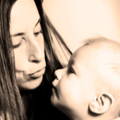Are More Moms Suffering from ‘Disordered Eating’ During the Pandemic? Should We Speak Up?

Recently, I found myself wanting to scream, “Why didn’t anyone tell me?” I also wanted to scream, “HOW could nobody tell me?”
This was right after a photo, from 2014, popped up in my Facebook memories. I’m standing beside my then 10 year-old daughter, Rowan, at one of our favourite hotels in Miami Beach. When I saw this photo, for the first time after so many years, I was shocked. Actually, I was downright startled. I did not notice our wide smiles or how Rowan was so much shorter than me.
What I did immediately notice was my bright green string bikini falling off me. My legs look like twigs. My usually ample-enough boobs are almost non-existent. I do not have an hourglass figure. I look like a ten year-old boy, with sunken cheeks and unflattering bones protruding. Basically, I look so skinny that I wonder if I would still be standing if someone blew on me, like a candle on a birthday cake.
But what disturbed me even more were the comments. “Beautiful!,” wrote one. “So cute!” wrote another. “Which one is Rowan?” asked another. “Great pic!” another commented. “Stunning!” wrote another.
Not one wrote anything like, “You look happy, but you are way too skinny!” Not one wrote, “Your legs are skinnier than your kid!” Not one person reached out, with, “You look happy, but you are TOO skinny and I’m worried about you and your health.”
I wish someone had! I did not look “beautiful” or “stunning” Clearly, at that time, I obviously wasn’t eating enough. I get why no one would dare tell me the truth. How do you kindly tell someone who has proudly posted a photo of themselves that they look unhealthy skinny?
I have no problem telling people if they have lipstick on their teeth, or that their boobs look lopsided, so “hike that left boob up in your bra,” or that their underwear line is ruining their sexy outfit, so take them off.
I know I didn’t have an eating disorder, but clearly, at that time, as with a handful of other times in my life, I had “disordered eating,” which I will loop back to in a minute. What distinguishes disordered eating from a full-blown eating disorder? It is all about “degree.” Someone with disordered eating often has the same behavior as those with eating disorders but at a lesser frequency or lower level of severity.
There have been many upsetting news stories recently about the uptick in eating disorders in children and teens during Covid. According to SickKids, social isolation and limits on extra-curricular activities caused by the pandemic are taking a toll, with the hospital seeing children as young as nine and ten being diagnosed with an eating disorder.
Kids as young as nine or 10!
The pandemic and pandemic stress is also fuelling spikes in eating disorders among adolescents. “These young people are so used to having a routine that they engage in every day — waking up, going to school, coming home, et cetera — and now they have no routine. And they’re quite disconnected from their peers. That’s a huge thing, especially during adolescence,” says Dr. Debra Katzman, co-founder of the eating disorders program at SickKids.
Teens, nowadays, can access so much information on the internet related to body image, dieting, and physical appearance. “Since the pandemic has started, we have had all kinds of access to online exercise videos and many things that kids have almost an over-exposure to now,” says Christina Bartha, of the brain and mental health program at SickKids.
But it’s not just children and teens who have access to online exercise. It’s clearly affected adults too, many of whom are mothers. I can’t be the only one to have noticed this, right?
I’m pretty sure that, like myself, a large majority of women scrolling down their social feeds have seen other women, proudly posting photos of their “New Covid” bodies, where it’s so painfully obvious they have overdone exercising and are clearly not eating enough. I’ve been noticing it more and more, as the months go on.
I know, all too well, the slippery slope that happens when you start exercising, lose a lot of weight in a short-ish amount of time, and, why no one will tell you that you look skinny, and not in a good way, even if they have the best of intentions.
It’s one thing to tell another woman she has lipstick on her teeth. That wouldn’t end a friendship. But, if you suggest to another woman, even a good friend, that they’ve gotten way too skinny, it could end a friendship. I mean, how many women do you truly think, if you told them they are now “scary skinny” and that you are worried, would be like, “Really? Thank you so much for pointing this out and worrying about my health! I’m so glad you told me! You really are a great friend!” I’m guessing, not that many. Even I’ve never dared told anyone this, and I wish people had told me!
I remember the first time someone pointed out my weight, and body-shamed me. I was 17 years-old, shopping with my mother for a prom dress. The saleswoman was an older woman. When I came out of the changing room, loving the tight red dress I had just tried on, this woman said, somewhat bitterly, “You better enjoy that body now, because you won’t always be this skinny.” I immediately felt a sense of shame. I had never dieted at that point. I had never even thought about calories. Before that shopping trip, I had never even thought about my weight, like at all!
That shopping trip left me with, obviously, a memory I have not forgotten. This random woman made me feel extremely uncomfortable and embarrassed about my body. Thanks to that experience, I don’t think I could point out to another woman, anything to do with weight, even as I do witness an increasingly worrisome amount of adults posting photos of their bodies, where they obviously think they look fit and healthy — why else would they post them? — even if the rest of us are thinking, “EEK. What happened to you?” while at the same time the same people write comments like, “You look fabulous!” “How did you do it?” But shouldn’t someone say something? Shouldn’t a friend or family member speak about their concerns? Doctors are concerned, but most of us are not doctors or experts on eating disorders.
“With the isolation, eating disorders really are taking hold and people are needing support more than ever,” says Colleen Hauck, of the Calgary Silver Linings Foundation. “…there’s lots of anxiety around the pandemic measures and the pandemic itself, you know, the need to control an environment.” For those of us worried about our kids, their education, and job security, the one thing we can control is what we put in our mouths and how much exercise we can fit in a day. I totally understand this. I’ve been there.
I tend to think it’s none of my business and that there really is no kind way to tell someone you’re worried about their massive weight loss. Do you have any suggestions? This is probably the most difficult conundrum I’ve ever thought about; Do you ever tell anyone that they look sickly, instead of sexy, after they’ve been extreme exercising and dieting all through Covid?
One of my friends did try to tell me the truth, when I was in my twenties, the first time I knew I had slipped into “disordered eating.” I had spent just over a year living in New York. I had met a friend at the gym, a gym mind you, that I only signed up for as a good way to meet people. I wasn’t wrong. This friend and I hit it of instantly. Soon enough, we were spending almost every day together.
I would meet her for a spin class in the morning, which then turned into a spin class followed by another exercise class followed by a salad lunch followed by a three hour walk, every day. I don’t blame my friend, of course, but thanks to watching how much she exercised, how much she obsessed about what she was putting in her mouth, I learned just how quickly one can spiral down this rabbit hole.
Within a month of our friendship, if I “treated” myself to a muffin, I would only eat the top, like my friend. Before bed, I would obsessively look over the gym schedule. Within a couple of months, I suddenly fit into a size double zero, a size I had never heard of before then. I didn’t really think anything of it, but I do think I was somewhat proud. Salespeople complimented me. Plus, if stores were selling size double zero clothes, there must have been other customers fitting into size double zero jeans.
That year was the start of my ongoing “situational disordered eating.” I would later over-exercise and under-eat after the birth of both my babies. I over-exercised and under-ate during my first divorce. I over-exercised and under-ate before my book launches. I over-exercised and under-ate during many months during my imploding relationship with my son’s father. And no one seemed concerned! Mostly, what I heard during these times I fell back into “disordered eating” was, “I’m so impressed with your will power!”
This is what I mean by “situational.” I never over-exercise and under-eat unless there was, and is, a goal, be it losing baby weight, slimming down before a book tour, or for an upcoming event. I do think, and again I’m not a doctor, many women are suffering from “disordered eating,” because they view Covid as “situational.” The one thing we can keep up consistently during Covid, when nothing else is consistent, is exercise, and what we put in our mouths.
But once, a friend did try to tell me the truth about how I really looked to the outside world, after I came back from New York.
When I got back to Toronto and walked into the offices where I worked at the National Post, this friend, who I hadn’t seen in more than a year, first words to me were not, “You’re back! I missed you! Let’s grab a drink!” Her first words to me were, “You look so, so skinny!” I was aware by her tone and her dropped jaw that she was not impressed, alluding that I looked very unhealthy. And, rightly so. By then, I was wearing double zero jeans, which were so loose I needed a belt! I truly didn’t realize I had lost THAT much weight, and while I knew she was honestly concerned, I admit I was annoyed. I didn’t want to hear the truth. I responded flippantly, “It’s New York! That’s what happens when you walk for five hours a day in such a great walking city!” I did get back to a healthy weight. I no longer had the luxury of exercising for three hours. My hourglass figure came back, as well as my breasts.
But, candidly? I couldn’t believe my eyes, recently, after another mother in her early 40s had posted a photograph, writing, “Feeling great! 100 days of exercise!” She is wearing a sports bra, and pulling down the waist of her workout pants, so we could see her entire (caved in) torso. So many commented on how “amazing” she looked. So many “liked” or “loved” her photo. I’m pretty positive that those who “liked” her photo, were actually thinking, “EEK! Please eat a cupcake,” as I was. But, again, who is going to publically, or even privately, say what we’re actually thinking?
I didn’t comment on her post, nor did I “like” or “love” it,” coming from a place of, “If you don’t have anything nice to say, don’t say it at all!” I just continued to scroll, amazed at not only how many mothers in my feed have lost so much weight. You would would be heartless to not be concerned at these photos. But, again, is it any of my business, or your business, to mention, “I’m worried about you?” I mean, not only do I suffer from “disordered eating” at times, but I think we can all agree that nothing good, really, ever comes out of talking about another person’s weight.
I did search for ways to kindly tell someone that they now look “sick” skinny. Not much popped up, unsurprisingly. I did find this amazing personal essay entitled, “Why ‘You Look So Skinny’ Is the Worst Compliment You Can Tell Me.” The author writes about becoming way too skinny. “I don’t know what the exact catalyst was. To be quite honest, I think a lot of it had to do with being in a brand-new city for the first time ever, working at a brand-new job with hugely unrealistic expectations.”
She was looking to be happy, and joined a gym. “Miraculously, I started to look forward to the consistency of my workouts,” she writes. “Then, I started using a smartphone app to track my calories in/calories out. I stopped eating so much fast food. I started losing weight. I began to gain control of something.” She writes how she “lived and died” by hearing, “You look so skinny.” She wanted to hear that more than “You are so kind,” or “You are so smart.”
I do believe that many of these adult women are suffering from disordered eating and they know it, just like I know it when I sometimes spiral. I may never feel comfortable telling someone the truth about their bodies, but it may be a good start to stop “congratulating” all of us who suffer from situational disordered eating, thanks to Covid, or for other reasons, when we post photographs. Definitely stop commenting, “Keep it up!”
Because it is a very slippery slope.
















